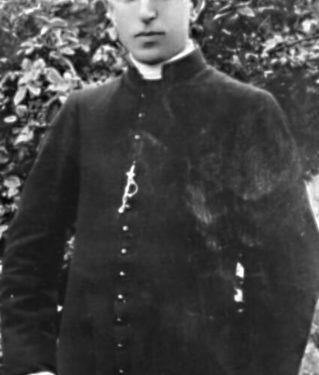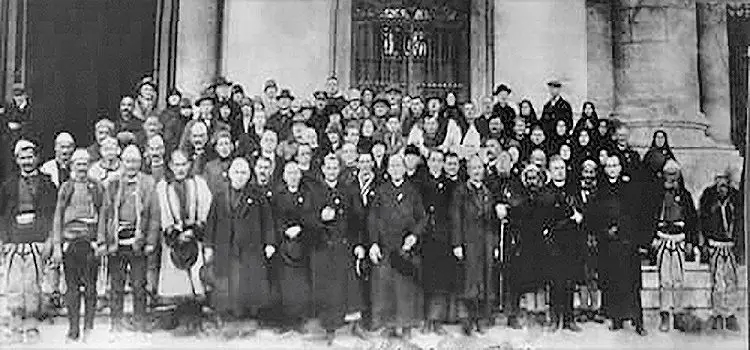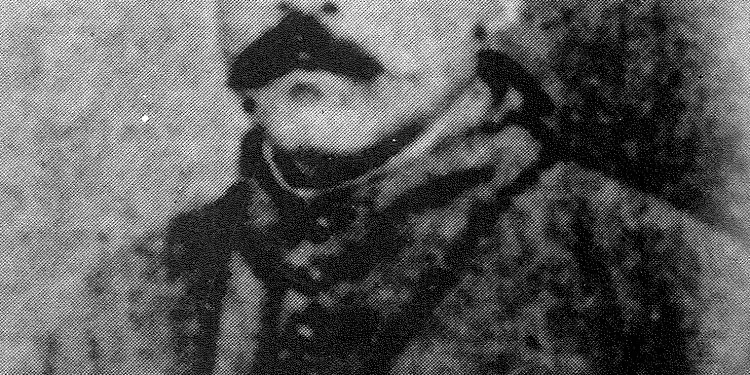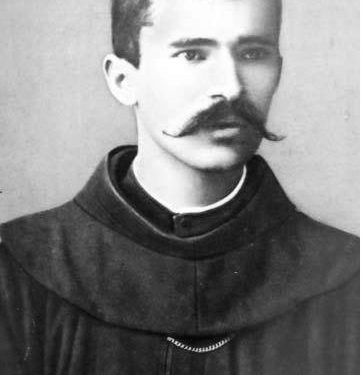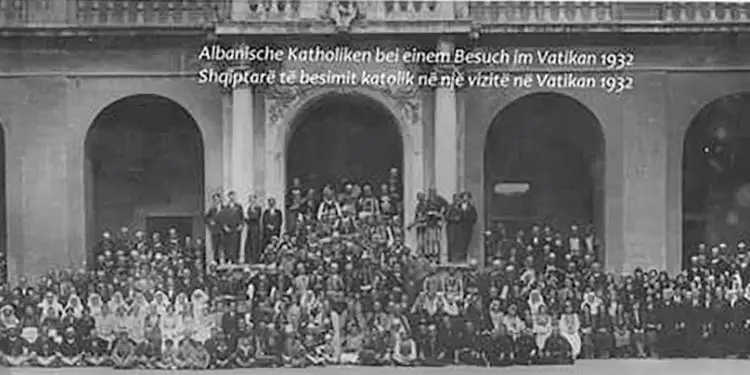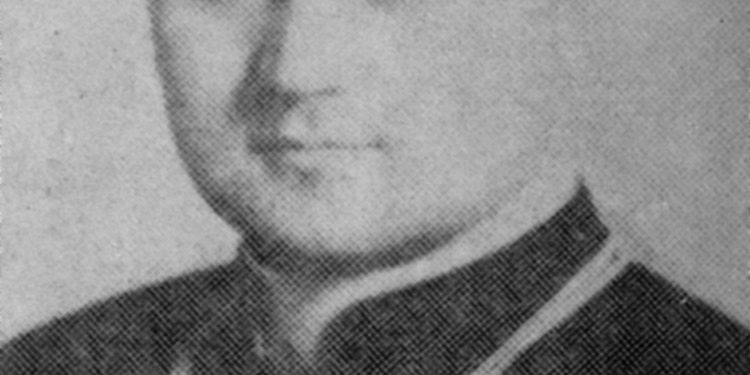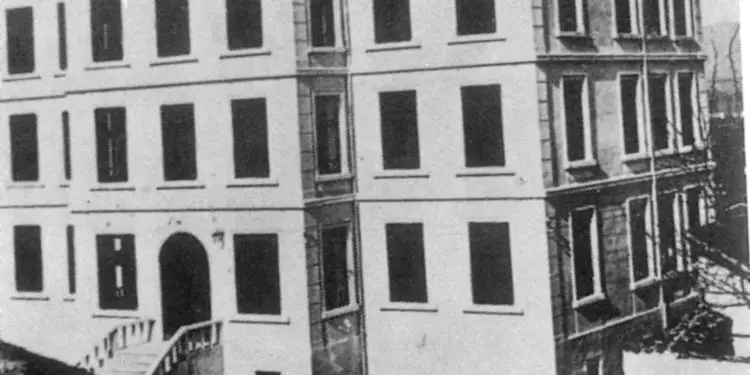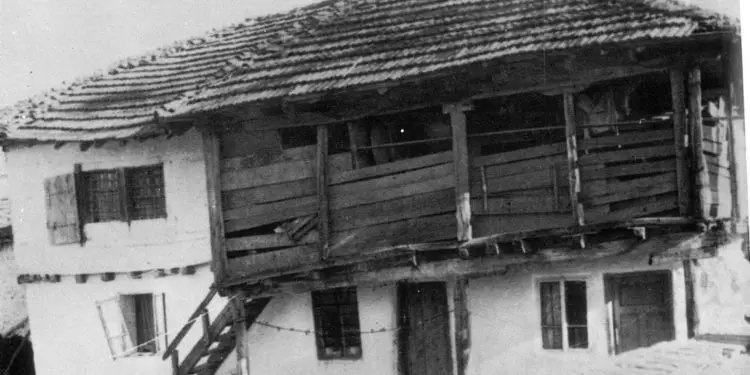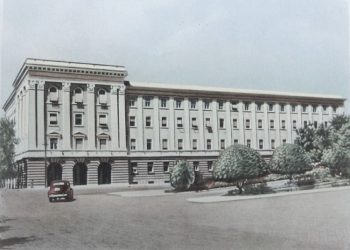NIKOLLË LOKA
Av. ALFDRED DUKA
NIKOLIN KURTI
The fourth part
WHY DOES THE POLITICAL ACCUSATION OF COLLABORATION NOT STAND?
-Continuing the tradition of native Catholic clergy –
Continues from last issue
Memorie.al/The rapprochement with the Italians is also motivated by the many economic needs of the Albanian Catholic Church!
During his service in Tirana, Dom Shtjefni decided to build a new church building, worthy of the capital. Among the people who helped the cleric Kurti was the Ambassador of Italy, Francesco Jacomoni, who after the invasion became the Deputy General of Viktor Emanuel (Governor of Albania). He had mediated at the National Bank for 300 napoleons of gold. But the church was not built because there was a lack of help from donors. It was the Apostolic Delegate Mon. Nigris who, in 1938, had suggested the construction of the Cathedral. Simultaneously with the collection of funds, Dean Kurti sent a request to the state for the construction permit, which was approved.
Catholic Parish Office Tirana, 17.IX.1942
Prot. No. 420/42
P.T. Prime Minister
The Central Building and Urban Planning Office of Albania, with its letter of 15-X-1940-XVIII, Prot. No. 126, he sent us a “plan” of the Imperial Promenade in Tirana, we also approved it for the system of the Catholic Cathedral Church and approved it through the Central Commission of Building and Urban Planning of Albania on July 14, 1940.
“We are attaching Stralcio to you with our letter with a request that after the Prime Minister has finished his work, he will be returned to us.
This Catholic Parish Office of Tirana. at the same time, I have the honor to ask you, the Prime Minister, to issue the necessary orders to the Office of the Bishops for the definitive assignment (tue vue kuja circ e per chark) of the Cathedral plot in question.
The issue of the appointment of this troudh has a form of urgency, as the Catholic Church authorities think; soon the foundations will be laid.
I am sure that this struggle of this Catholic Parish Office will be taken into account and will be adapted to the highest department. The undersigned would like to thank and always remain with respect to that P.T. The Prime Minister.
Catholic Parish Priest
Don Shtjefën Kurti
The Dean of the Deanery of Tirana had the duty to intervene with the state authorities to meet the spiritual needs of the believers, within the conditions and circumstances. He addresses the Directorate of the Women’s Institute, to accept the nuns’ religious dress, as well as to give them the right to go to church for Sunday mass:
“We sign, vicar of the city, have the honor to ask you to be kind enough to let the Catholic students of that Institute come to the church to see mass on Sundays and other holidays, in which they do not attend school, because for them it is a serious religious duty to attend mass during those days of great abundance. I await a favorable and affirmative answer; I have the honor to present my most sincere regards”.
Charity activity
The Church’s social mission emphasizes support for the sick, the poor and the afflicted, through corporal and spiritual works of mercy. Charity is a great instrument of evangelization, both for those who give and for those who benefit from the services of the Church. But the Church expects everyone to meet their own and their family’s needs and helps only in emergency situations. As soon as he settled in the Capital, Dom Shtjefni asked the government to set up a Charity Committee, so that he could help poor families and people without support.
He continued this practice even during the years of the occupation. The funds for the charity works would be taken from wealthy families and would be administered by the Head of the Committee, in full agreement with the parish priest of the country. In order to better manage the income that was collected for helping the poor, the Catholic Church in Tirana created a charity committee, which functioned based on established rules. The Charity Committee was permanent and operated near the Catholic Parish.
- The committee is chaired by His Excellency the Archbishop of Durrës and under the responsibility of the Parish Priest of Tirana.
- Its purpose is to help the poor.
- The means for this charity work have to be requested from the people and have to be put into action by the Parish of the Committee in full agreement of the Parish Priest of the place.
- The committee is made up of those generous and kind-hearted people, who wish to participate in it and oblige me to pay a monthly tax, set by everyone as much as they can, and this is how the coffers of the committee are raised.
- From the members of the Committee, under the direction of the Parish Priest, the Parish was elected, which will be made up of a Chairman, two Councilors, a Treasurer and a Secretary.
- The task of the Kyetar will be to take care of the needs of the orphans, the elders who come to help and set the formalities of this action.
- The task of Councilors will be to help the President in the development of his work.
- The task of the Treasurer will be to keep the treasury under the control of the Chairman of the Councilors, and to keep the registers of accounts in order, as long as the reasons are given to the Chairman of the Councilors for any prior action on the way out.
- The Secretary’s duty is to keep the diary of the Committee on its history.
- Twice a year, all the members of the Committee have to meet, and whatever they have an opinion or wish for, for the benefit and improvement of the Orphans’ Committee, money is to be collected eyes In the second meeting, the new Party was elected.
- In case of a point of view or a disagreement of any kind, at least I have to listen to the voice of the Parish Priest; in the big koft, it must be submitted to the judgment of the Archbishop.
- The admission and expulsion of members usually belongs to the Parish Priest, according to the proposal of the parish.
Tirana, 28.1.1938
The fruit of the charity works is the establishment of the Befotroph of Tirana, for which Dom Shtjefni collaborated with the wife of the Viceroy General, Maja Jakomoni. For those who have seen this action as an act of betrayal, the question must be asked: Who was betrayed by erecting a Befotroph that the country lacked until then? Why was his rise politicized, when in fact it is a human act, regardless of who initiated his rise.
If with that act, Mrs. Jakomoni intended to win the sympathy of the Albanians, this was not a problem of the Church. Such initiatives are always popular and are accompanied by propaganda, and of course the regime had done it, but it was not the fault of a cleric either for the propaganda or for the effect it would have on the people. On the other hand, Befotrofi would be administered by the Church and not by the authorities, so it came more as a work of the church than of the state.
In the letter he sends to the Archbishop it is written:
Parish office
Of the Catholic Church
Tirana Tirana 22-VII-1941
So. No. 342/41
Venerable Mother Superior
Following the requests I received from Countess Danna Moja Jakamoni, I once again brought you to the Archbishop to make a final decision in the case of Befotrofi to stand up.
The Elder has decided this work; therefore we are announcing this decision so that in the meeting of the Chapter, it will be seen before the eyes of the begging for this need.
With respect
The parish priest
Don Kurt
Dom Shtjefni introduced the practice of cultural activities in order to collect income for charity and for this purpose he addressed the Ministry of Popular Culture:
Chairmanship of the Council of
Ministers No. 282/51
Ministry of Popular Culture
Tirana
The parish of the Catholic Church of Tirana spontaneously approached the Committee to Help the Wretched from the war and made available its dramatic group for two artistic performances. The first play to be played is titled:
“Little Paraxhin” and the second one that can be prepared within a month is: “Fatherly Love”. All relevant arrangements and the sale of tickets will be completed by the Municipality of Tirana itself.
Those from the Ministry of Popular Culture are only asking for help in securing a cinema hall for the above-mentioned performances. All the proceeds will be poured in favor of the poor from the war. Therefore, please have the kindness to enter into agreements with one of the Directors of the cinemas to make a salon available for this purpose and set the relevant date”.
The parish priest of Tirana expects the conclusion directly from that P.T. The minister. On April 6 comes the approving response of the Ministry of Popular Culture, signed by one of the directors at the time, Nush Sheldia, which with letter No. 665, and allows the performance of the drama “Jevga e Volga” in the hall of the Parish of Tirana.
The church had collected funds to help the poor. In a letter to Prime Minister Rexhep Mitrovica, Dom Shtjefni informs him: So on 21.IV.1944 he sends a letter to Prime Minister Rexhep Mitrovica, where he informs him about this issue:
Parish priest Tirana on 21.IV.1944
Don Shtjefën Kurti
Prot. No. 132/44
Mr. Rexhep Mitrovica, Prime Minister
Tirana
Mr. Prime Minister, I have the honor to inform you that today I have taken to the bank, the President of the Youth Catholic Action of Saint Stephen’s District, Mr. Luigj Doda, with the amount of Fra. Two thousand seven hundred and sixty-two (2,762) for the benefit and assistance of the poor from the war. She learned a lot from the theatrical performance played by the Theater Group of Saint Shtjefi District, at the “Kosova” Cinema on April 15, 1944.
I have attached the list of expenses. Unfortunately, the amount is so small, they said that even the expenses were quite modest, but I emphasize that they did not have even the slightest support from whom they needed.
Accept, Mr. Prime Minister, my deepest respects.
The parish priest
Don Shtjefën Kurti
Just as he asked the state to contribute to charity, Dom Shtjefën Kurti asked for the commitment of the Church to help the Catholic laity. He himself, in the name of the Church, undertook the distribution of those aids.
Parish Office
Of the Catholic Church
Tirana
P.T. Tirana Ministry of Economy
Prot. No. 119/44
The Parish Office begs Father P. T. Dikaster to remember and honor me by giving, as always, on the occasion of Easter, a quantity of food for the staff of the parish as well as for the Catholic population of the city.
The parish priest
Don Shtjefën Kurti
Dom Shtjefni took protection of people in need, who were faced with fate in Tirana and saw the Church as their only support, as was the case of two orphans Sokol and Zef Ndoi from Puka, who asked to be settled in the Vorfnore Shelter. He also intervened to send a little girl named Tone to the Orphanage that was administered by the Church.
In a letter sent to the Albanian Red Cross, Kurti writes: “We have a nine-year-old girl named Tone, the daughter of Nik Gjon and Marisa Rrok Harusha. The girl is from Prizren and does not know her father, because he left his wife before she was born (two months before she was born), and I do not know if he is still alive. The girl is raising orphans. I want you to work for a living. But they do not accept all children in the service. If you know that the child has completed three grades of school in the Serbian language in Prizren, the undersigned has the honor of begging the Albanian Red Cross to accept him as he was seen in the Vorfnore Shelter”.
Parishioner Kurti encountered daily people from Hallejin who had no other door to knock on, except the House of God, and he committed himself to helping them. I expressed this daily work that he did in silence in a letter that I sent to the leaders of the Congregation of the Immaculate Virgin. Dom Shtjefni writes: “We work hard every day to do what we can, even in extraordinary ways, to help the poor of the city, as well as others that work brings to this city”.
Organizer of educational and cultural activities
The Catholic Church in Tirana had several schools and kindergartens, where nuns or clergy taught, as well as lay people paid by the Church itself. From a document dated August 15, 1942, signed by the commanding parish priest, Don Luigj Gashi, we can extract some of the educational institutions that were maintained by the Church. The Stigmatine Sisters had a school with 70 students, while the “Daughters of Our Lady” religious society had two schools with boarding students; The Servite Sisters ran two infant and labor schools, the first with 170 students, the second with 39 students.
Clergy also taught in these schools. On the other hand, the Church had the duty to determine, among the clergy, the religious teachers for the state schools were paid by the state for the work they did and were part of the school bodies. All the clergy of the parish of Tirana have served as faith teachers, including Dom Shtjefën Kurti himself.
Dom Shtjefni had experience and passion for the development of cultural, artistic and sports activities. He started this job in Skopje, then wherever he served: Prizren, Novosella, Gurëz and then in Tirana. From the information that Don Shtjefni sent to the Archdiocese of Durrës for 1943, the circle of Saint Terezina has 55 members, the circle of the Daughters of Our Lady has 60 members, and girls in the manual work school 107 members”. Dom Shtjefni had made a request to the Ministry of Popular Culture, with letter No. 454/2 dt. 4-6-1942 and was able to obtain permission for the establishment of a cinema near the church. “This Minister on dt. 11-III-1942, granted that Parish a permit to open a cinema in the courtyard of the Church of this city”. Memorie.al
The next issue follows




